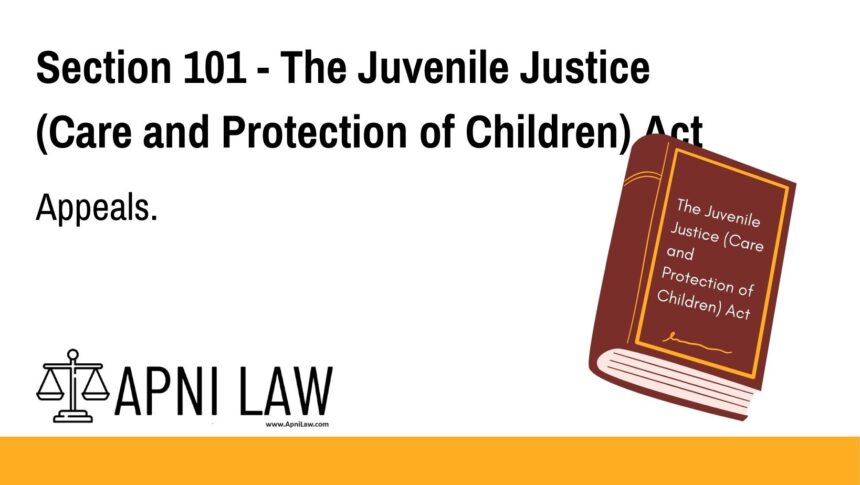Code: Section 101 of the Juvenile Justice Act
(1) Subject to the provisions of this Act, any person aggrieved by an order made by the Committee or the Board under this Act may, within thirty days from the date of such order, prefer an appeal to the Children’s Court, except for decisions by the Committee related to Foster Care and Sponsorship After Care for which the appeal shall lie with the District Magistrate:
Provided that the Court of Sessions, or the District Magistrate, as the case may be, may entertain the appeal after the expiry of the said period of thirty days, if it is satisfied that the appellant was prevented by sufficient cause from filing the appeal in time and such appeal shall be decided within a period of thirty days.
(2) An appeal shall lie against an order of the Board passed after making the preliminary assessment into a heinous offence under Section 15 of the Act, before the Court of Sessions and the Court may, while deciding the appeal, take the assistance of experienced psychologists and medical specialists other than those whose assistance has been obtained by the Board in passing the order under the said section.
(3) No appeal shall lie from any order of acquittal made by the Board in respect of a child alleged to have committed an offence other than the heinous offence by a child who has completed or is above the age of sixteen years.
(4) No second appeal shall lie from any order of the Court of Session, passed in appeal under this section.
(5) Any person aggrieved by an order of the Children’s Court may file an appeal before the High Court in accordance with the procedure specified in the Code of Criminal Procedure, 1973.
(6) Any person aggrieved by an adoption order passed by the District Magistrate may, within a period of thirty days from the date of such order, file an appeal before the Divisional Commissioner.
(7) Every appeal filed under sub-section (6), shall be decided as expeditiously as possible and an endeavour shall be made to dispose it within a period of four weeks from the date of filing of the appeal:
Provided that where there is no Divisional Commissioner, the State Government or Union territory Administration, as the case may be, may, by notification, empower an officer equivalent to the rank of the Divisional Commissioner to decide the appeal.
Explanation of Section 101
Section 101 provides the legal framework for appeals against decisions made by Juvenile Justice Boards, Child Welfare Committees, the Children’s Court, and District Magistrates under the Juvenile Justice Act.
Key Highlights:
- Appeals can be filed within 30 days of the order.
- The primary appellate authority is the Children’s Court, except for certain decisions where the appeal lies with the District Magistrate or Divisional Commissioner.
- No appeal is allowed from an acquittal of a child over 16 unless the offence is heinous.
- No second appeal is allowed beyond the Court of Session.
- Appeals from the Children’s Court go to the High Court.
- Adoption orders passed by a District Magistrate can be appealed before the Divisional Commissioner.
Illustration
Example 1: Appeal Against Juvenile Board’s Decision
A boy aged 17 is accused of a heinous crime and the Juvenile Board conducts a preliminary assessment under Section 15. If the Board decides to try him as an adult, he or his family can appeal this order under Section 101(2) to the Court of Sessions, which may also seek expert psychological and medical opinions.
Example 2: Appeal of Adoption Order
A couple is dissatisfied with the adoption order passed by the District Magistrate. Under Section 101(6), they may file an appeal before the Divisional Commissioner within 30 days. The Divisional Commissioner is expected to resolve the matter within four weeks.
Example 3: No Appeal Against Acquittal
If a 16-year-old is acquitted of a non-heinous offence by the Board, Section 101(3) bars any appeal from that acquittal.
Common Questions and Answers on Section 101
1. Who can appeal under Section 101?
Any person aggrieved by an order of the Juvenile Justice Board, Committee, Children’s Court, or District Magistrate under the Act can file an appeal.
2. What is the time limit for filing an appeal?
The appeal must be filed within 30 days. However, a delay can be excused if the appellant shows sufficient cause.
3. Can there be a second appeal?
No, Section 101(4) explicitly states that no second appeal lies from the Court of Session’s order passed in appeal.
4. What if there’s no Divisional Commissioner?
The State Government or Union Territory may empower an equivalent officer to hear such appeals through a notification.
5. Is legal aid available for filing appeals under this section?
Yes, under the Juvenile Justice Act and legal aid provisions, juveniles and their guardians are entitled to free legal representation in such matters.
Conclusion
Section 101 of the Juvenile Justice (Care and Protection of Children) Act, 2015, ensures that all stakeholders, including children, guardians, and adoptive parents, have a clear legal route to appeal against decisions affecting their rights. It emphasizes timely justice, with specified appellate authorities and deadlines, and upholds the child-friendly principles of the Act.
For expert legal guidance on juvenile justice matters, visit ApniLaw today! 🚀








